[dropcap size=big]G[/dropcap]erardo Garcia-Urbina has lived at the same crumbling Highland Park apartment for the past 20 years. The 45-year-old, along with his partner and three kids, put up with all manner of issues with the place. Water is leaking out of the bathroom ceiling, the dishwasher is coming apart from the kitchen counter, and they have cracked and yellowing floors. There are rats nesting by the apartment building’s dumpster.
Then, a company bought the building in September 2017. Garcia-Urbina started to see some minor improvements, such as a paint job on the front of the building and new carpets put in the empty units. Maybe he’d get his unit repaired?
Instead of fixing his leaky bathroom ceiling, Interstate Equities Corporation told him his rent would go up from $1,160 a month to $1,860, an increase of 60 percent. When he asked around, he and other tenants at the Avenue 64 Apartments found the new owners increased their rent from 50 to 70 percent, without any meaningful improvements to their units.
He found out about his steep fee hikes when he got a notice pinned on his front door in February by on-site manager Cedric Brooks. The landlord additionally tacked on new trash, water, and sewage fees to the tune of $120 a month.
“I’m already spending most of my paycheck on rent. I can’t afford this. I really can’t,” Garcia-Urbina tells L.A. Taco on Labor Day. He’s standing in his apartment kitchen while his son plays a computer game a few feet away in the living room.
“I don’t know where we can go if we have to leave.”
He just got off work from the L.A. Country Club, where he’s a dishwasher. Garcia-Urbina says Highland Park is the only place his kids ever knew. They’re going to local schools – Franklin High School and Burbank Junior High School — and they don’t want to leave their neighborhood friends.
RELATED: Snapchat Is Pulling Out of Venice, and Gentrification Activists Are Overjoyed
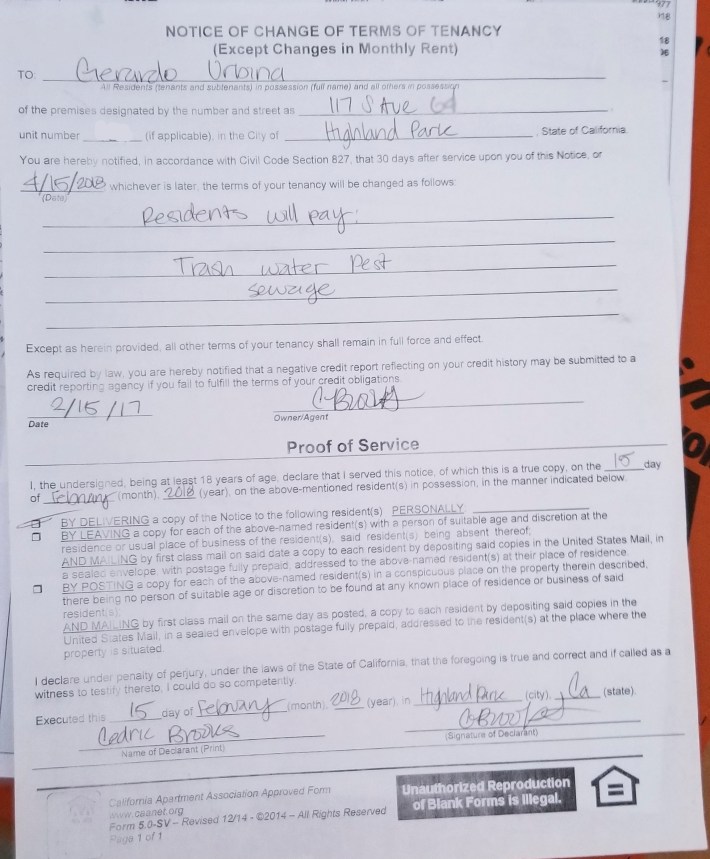
That’s why Garcia-Urbina is joining other tenants on a “rent strike.” They say they’re refusing to pay rent until the new owners meet them, negotiate a fairer rent increase, and make overdo repairs. They’ve solicited help from the L.A. Tenants Union, a group that has organized tenants in Boyle Heights and Westlake in similar actions.
The new owner IEC didn’t try to increase the rent on all of the tenants. While some neighbors got rent increases, Leday and Victor Rodriguez received an eviction notice instead, only to see it dropped a few months later.
“They dropped our case because of the protest. My case is different because we haven’t received [a rent increase notification] yet,” Leday said at a protest in front of their building in late August. “But I know it is coming.”
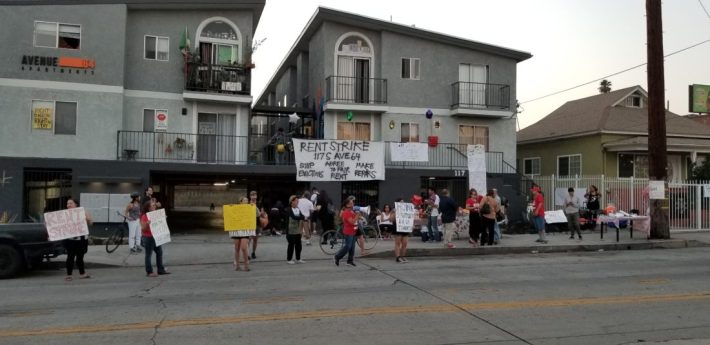
Rent Strike
[dropcap size=big]S[/dropcap]oon after they launched the rent strike in July, the tenants and supporters traveled 350 miles north to IEC’s offices in Los Altos to protest what one tenant, Rosemary Serna, called “Silicon Valley Investors.”
Serna joined the Aug. 25 protest. The tenants draped a banner over the front of their building describing their situation, attracting a lot of attention and approving honks from passing cars. “When they bought the building they made a lot of renovations, but not to the units. They gave us a 700 dollar rent increase without any repairs or renovations to our units,” Serna says.
She’s been living there for about three years raising her little girl, now 5.
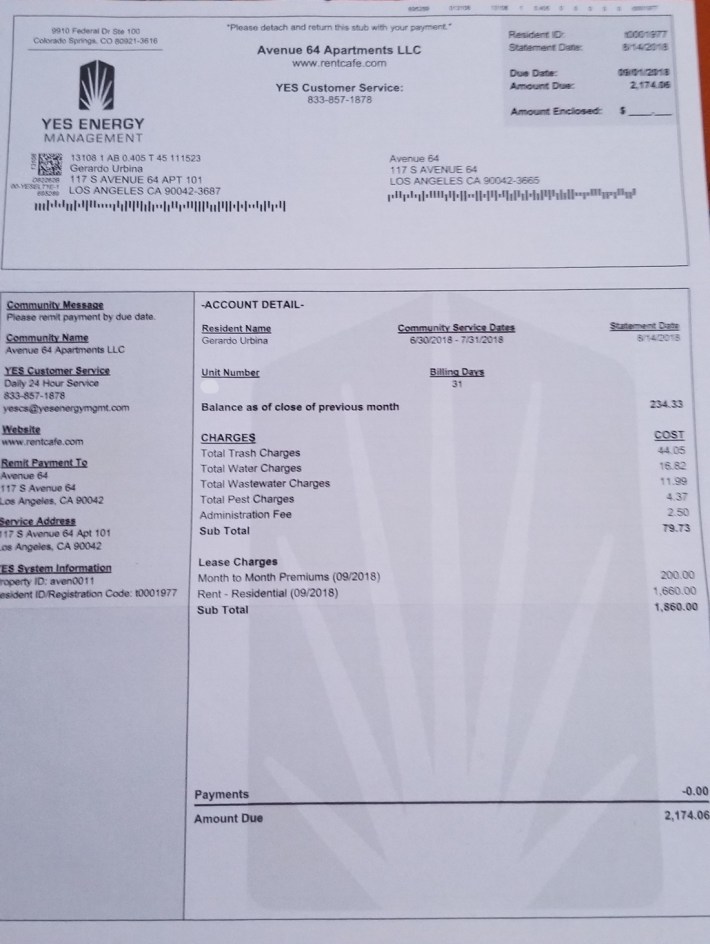
L.A. Tenants Union organizer, Nancy Popp, says the tenants are planning another trip to IEC headquarters in Los Altos this month to protest what IEC is doing to tenants in Highland Park.
IEC is headquartered in Silicon Valley, in Northern California. The company announced in March 2016 that it amassed a $200 million trust to buy up distressed properties in California, renovate them, and make them profitable. They acquired the 24-unit apartment complex for $6.65 million, according to city records. That’s about $277,000 per unit.
Although IEC made some renovations to the building, including a paint job, tenants claim those improvements were only made to unoccupied apartments, before giving the established tenants a two-month notification of the rent hikes.
Multiple phone calls were made to IEC office in Los Altos for this story, including messages sent to a Facebook page under company co-founder Marshall Boyd, but the company has not responded.
Tenants face evictions
[dropcap size=big]H[/dropcap]ighland Park is not the first neighborhood to see rent strikes. Tenants at apartments on Burlington Avenue apartments in Westlake and ones near Mariachi Plaza in Boyle Heights recently launched rents strikes.
In Boyle Heights, after a year-long rent strike, residents at the Mariachi Plaza apartments agreed to pay a portion of the rent withheld during the strike, and to pay a roughly 14 percent price increase moving forward. In return, they got a 42-month lease with yearly rent increases capped at 5 percent. They’ll also be able to collectively bargain new leases as a tenants association. Those tenants faced 80 percent rent hikes.
The Burlington case isn’t so clear cut. Of the roughly 90 families who participated in the rent strike in Westlake over the past year, 10 have settled their evictions, five won their court cases and three lost, according to a report. One family of five reportedly got evicted.
Rent gouging and gentrification is not new in Northeast L.A., but rent strikes are. The tenants strategy of withholding rent is riskier.
RELATED: These Old-School Shops in Highland Park Just Heard Their Rent Will Rise By 250 Percent
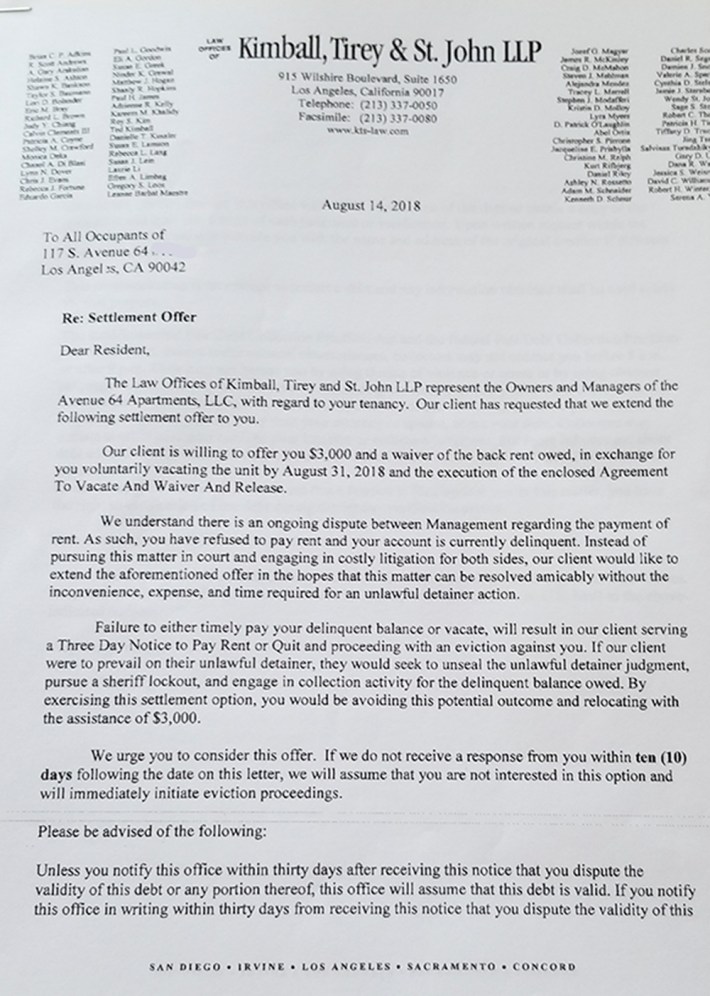
In the case of Avenue 64, tenants must face down a more formidable landlord, in the form of a huge real estate investment corporation based in Silicon Valley with hundreds of millions of dollars under management.
“The effectiveness of a rent strike depends on how vulnerable the landlord is, how organized the tenants are, and how much publicity they get,” says Occidental College professor Peter Dreier, who chairs the university’s department of urban and environmental policy.
At first blush, withholding rent from your landlord sounds pretty extreme. After all, it could it get you evicted from your home if your strike fails to bring the landlord to the negotiation table. And not paying your rent could also damage your credit rating and, therefore, any chance at finding a future place to rent.
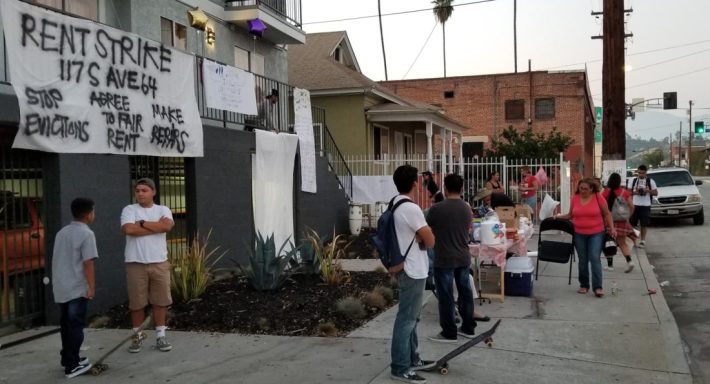
But tenants say they had no choice.
“Some big landlords might have the financial capacity to wait out the tenants. But they might not like the bad publicity,” Dreier tells L.A. Taco. “If the tenants are organized enough to picket in front of their house, or on Sunday in front of their church, and in front of neighbors. [The landlords] might not like to be embarrassed in front of their family, friends or colleagues.”
Popp of the L.A. Tenants Union didn’t give details but says their rent strike strategy could help tenants facing similar challenges in other buildings — particularly those that aren’t protected under Los Angeles Rent Stabilization Ordinance, which applies to any place constructed before October 1978. The Avenue 64 Apartments were built in 1987.
Now Gerardo is facing eviction by the new owners. But as far as he’s concerned, there’s no other choice but to strike. His back’s against the wall. Holding up a threatening letter he received from lawyers representing the landlords, offering him $3,000.00 to drop the strike and pack up and leave, or else.
He had one response: “I told them, ‘No.’ My kids grew up here. They go to school here. We have no other place to go.”
RELATED: Boyle Heights Mariachis Take a Win Against an 80% Rent Hike







